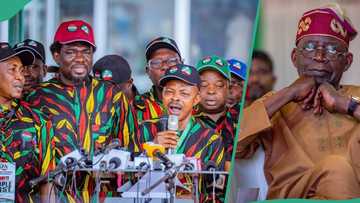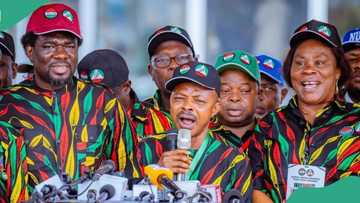14 Reasons Tinubu’s Govt Gave for N60,000 New Minimum Wage
- At the moment, the leadership of the NLC and the TUC are not pleased with the decision of the federal government on the new minimum wage
- Labour on Friday, May 31, declared an indefinite strike following FG's inability to increase the N60,000 minimum wage offer
- Some of the major reasons President Bola Tinubu's led federal government offered N60,000 as the new minimum wage while labour demanded N494,000 have been revealed
Legit.ng journalist Esther Odili has over two years of experience covering political parties and movements.
President Bola Ahmed Tinubu's led federal government and organised labour on Friday, May 31, failed to reach an agreement on a new national minimum wage.

Source: Facebook
The government added N3,000 to its initial offer of N57,000 proposed last week, taking the total figure to N60,000, while labour lowered its demand by removing N3,000 from the N497,000 it proposed last week, arriving at N494,000.
Since January 2024, the tripartite committee has been locked in talks over a new minimum wage.
PAY ATTENTION: Click “See First” under the “Following” tab to see Legit.ng News on your Facebook News Feed!
To fast-track the negotiation process, the leadership of the Nigeria Labour Congress (NLC) and its Trade Union Congress (TUC) counterpart, on May Day, gave the FG's committee till the end of the month to wrap up talks on the new national minimum wage.
Unfortunately, that ultimatum expired on Friday night, May 31, without an agreement as the government refused to make a new offer beyond N60,000.
A source at the meeting told the press that negotiations hit the brick wall when the government and the organised private sector remained adamant on the N60,000 offer they made on Tuesday.
Legit.ng reported that the government, however, defended its offer of N60,000 per month.
14 reasons FG offered N60,000 as new minimum wage:
In light of the above development, here are 14 reasons the FG gave for a N60,000 minimum wage as reported by The Nation:
- N35,000 wage award for all treasury-paid federal workers.
- N100 billion for the procurement of CNG-fuelled buses and CNG conversion kits.
- N125 billion conditional grant and financial inclusion to MSMEs.
- N25,000 each to be shared to 15 million households for 3 months.
- N185 billion palliatives (loans to States) to cushion the effects of fuel subsidy removal.
- N200 billion to support the cultivation of hectares of land to boost food production.
- N75 billion to strengthen the manufacturing sector.
- N1 trillion for student loans for higher education.
- Release of 42,000 metric tons of grains from strategic reserves.
- Purchase and onward distribution of 60,000 metric tons of Rice from the rice millers association.
- Recent salary increase of 25-35 per cent on all consolidated Salary structures for federal workers.
- 90% subsidy on health costs for Federal Civil Servants registered on the National Health Insurance Scheme(NHIS).
- Light rail commissioned in Abuja to relieve transportation cost till the end of the year. Lagos state had already commence same initiative with their Blue and Red lines.
- In addition to the freedom of civil servants to engage in agriculture, federal government has approved the inclusion of ICT services for alternate sources of income.
Minimum wage: FG begs labour to call off strike
Earlier, Legit.ng reported that the federal government pleaded with organised labour to reconsider its decision to embark on an indefinite strike from Monday, June 3, 2024.
The minister of information and national orientation, Idris Mohammed, in an exclusive interview with The Punch on Saturday, June 1, noted that industrial action was not the solution to the ongoing negotiation for a new minimum wage for workers.
Proofreading by Nkem Ikeke, journalist and copy editor at Legit.ng.
PAY ATTENTION: Donate to Legit Charity on Patreon. Your support matters!
Source: Legit.ng





